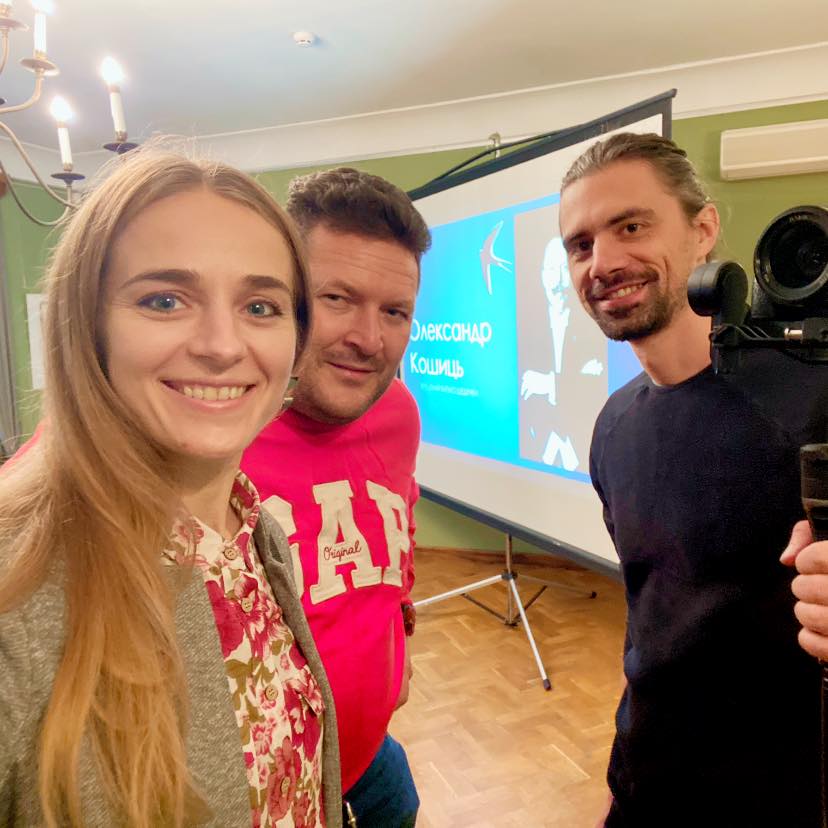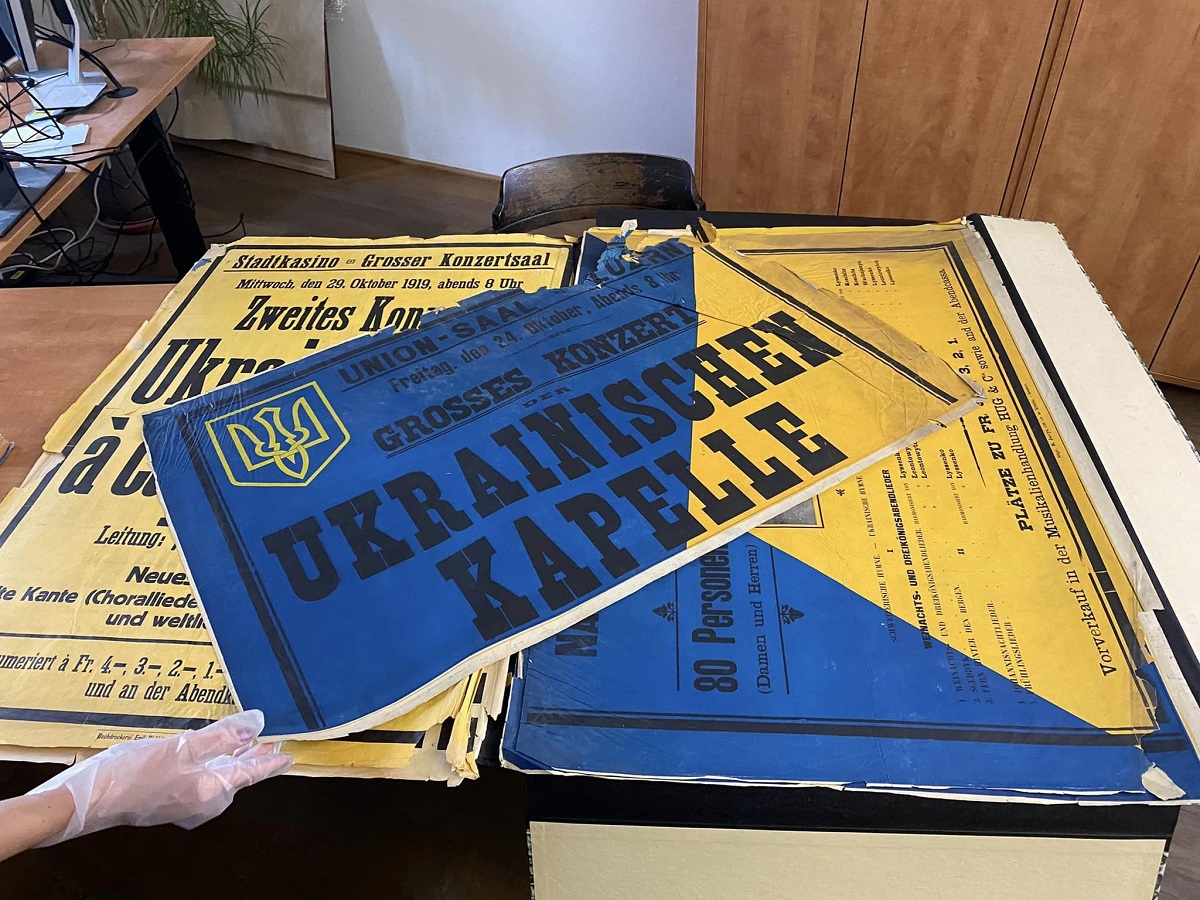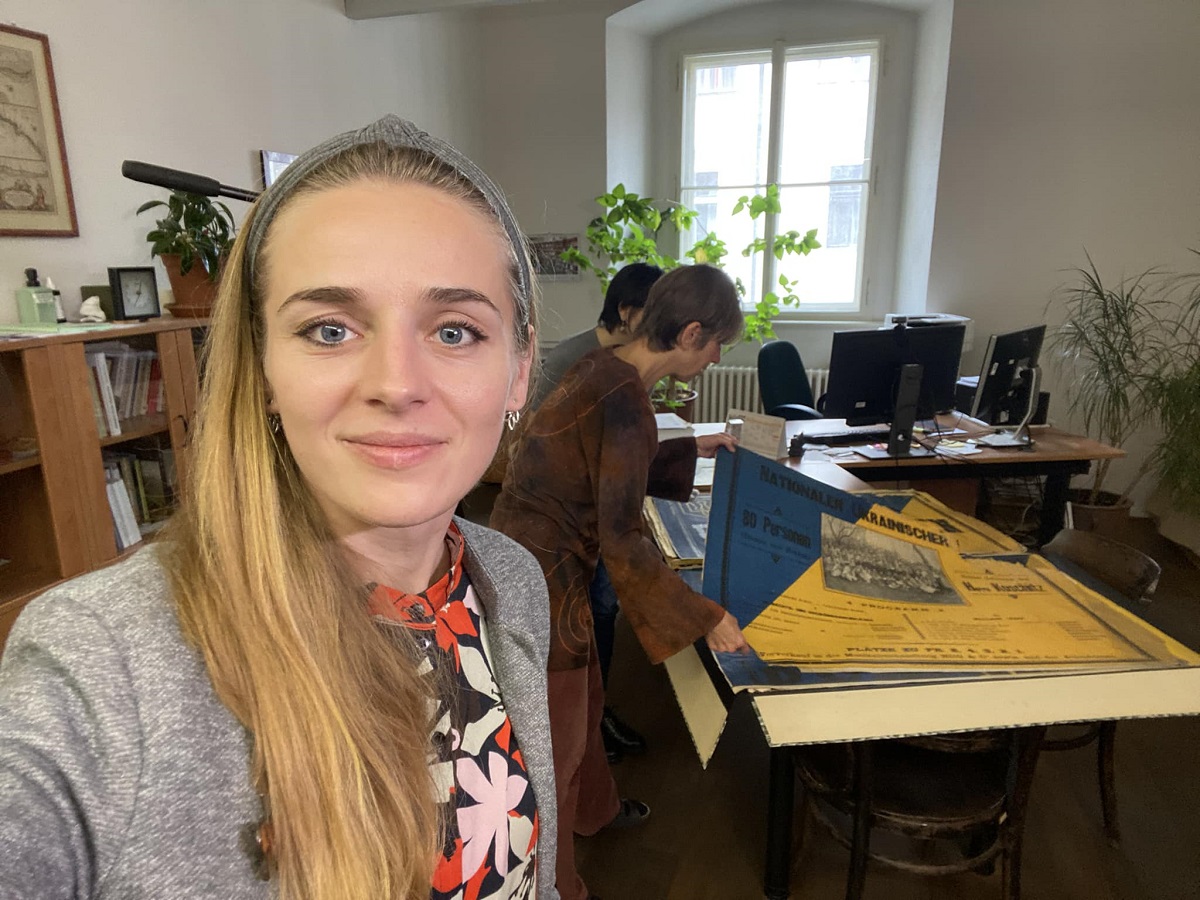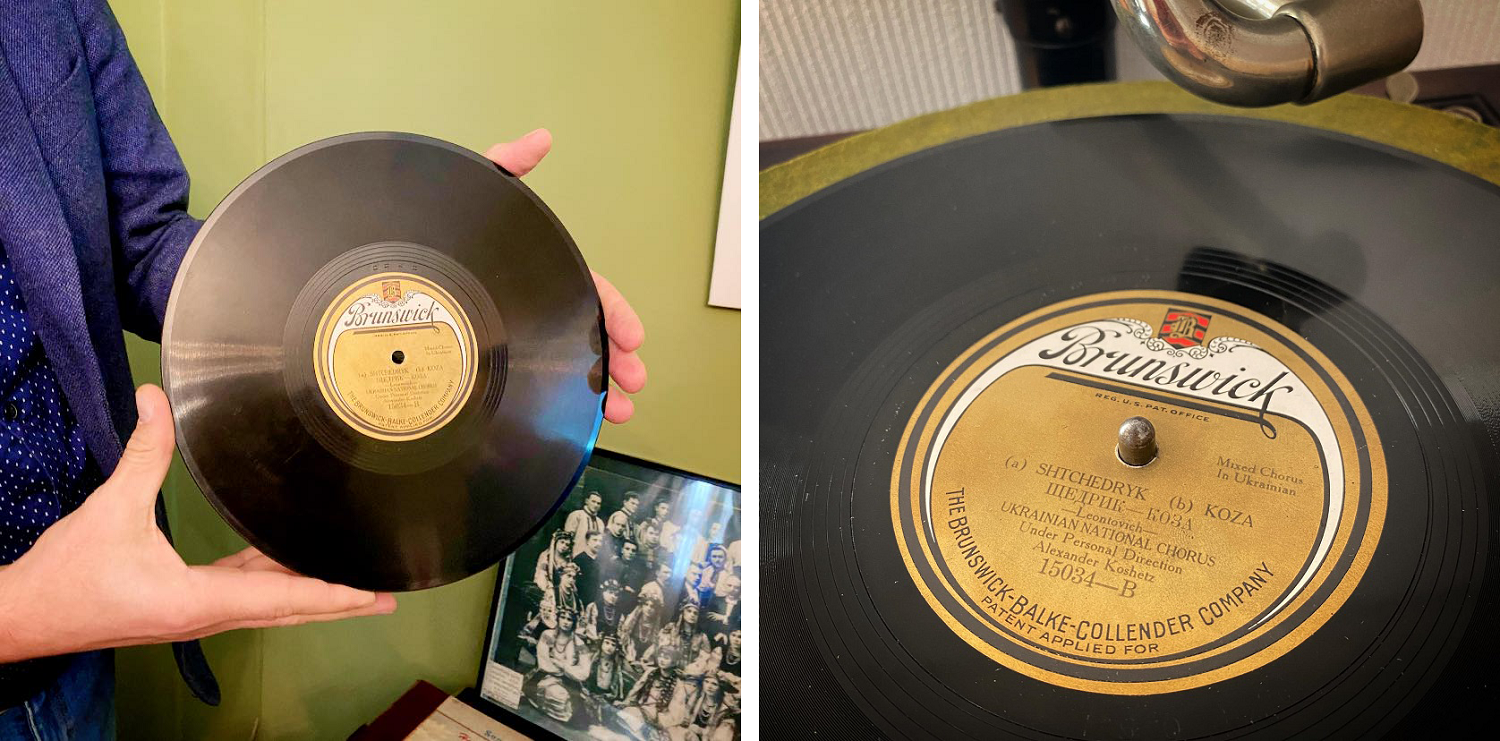Грудень 23, 2022
«Щедрик проти “русского міра”»: історія культурної перемоги
У неділю, 25 грудня, о 20:25 відбудеться прем’єра документального фільму «Щедрик проти “русского міра”» на телеканалі Суспільне Культура та ютуб-каналі Суспільне Культура. Фільм створений на замовлення Суспільного командою «Prosto production».
Фільм «Щедрик проти “русского міра”» розкриває нам захопливу історію про те, як візит на світський концерт 1 січня 1919 року навів Симона Петлюру на думку доручити диригенту Олександру Кошицю створення хору й відрядити його у світове турне для промоції української культури. Світові концерти хорової капели диригента Олександра Кошиця сто років тому проходили майже в таких самих умовах протистояння російській агресії.
Читайте також: Прем’єра фільму «Щедрик проти “русского міра”» на Суспільне Культура
Про виникнення ідеї створення фільму, зйомки в чотирьох країнах Європи за маршрутом виступів капели й бажання показати цю неймовірну історію усім розповідають творці фільму: сценаристка Наталка Пономарів і продюсер стрічки Вячеслав Пономарьов.

«Ця ідея виникла кілька років тому і ми шукали слушної нагоди її втілити. Так зійшлися зорі, що ми одночасно стали переможцями конкурсу і в Держкіно, і на Суспільному. Очевидно, що, маючи позитивний досвід співпраці з Суспільним під час зйомок серіалу “Спадок Терещенків”, ми обрали співпрацю з телеканалом. Тож можна сказати, що цього разу і Суспільне виграло в нас конкурс (сміється — ред.), — розповідає Вячеслав Пономарьов. — До нашої команди долучилася Тіна Пересунько, яка є найбільшою промоутеркою теми культурної дипломатії УНР та дослідницею гастролей Української республіканської капели. Вони разом з Наталкою написали сценарій до фільму».

«Зараз багато українців уже, звісно, знають і пишаються тим, що відома на весь світ “Carol of the bells” — це українська мелодія “Щедрика” Миколи Леонтовича. Але як і коли пісня потрапила за океан? Яку роль у цьому зіграв Симон Петлюра? — зазначає Наталка Пономарів, — Мені хотілося відкрити історію гастролей капели якомога більшій кількості людей. Це турне саме по собі захопливе і сповнене пригод, та водночас підіймає низку важливих історичних паралелей.
Це історія про хор, який евакуювався з Києва, коли місто захоплювали росіяни. Хористам не було куди повертатись. Вони не мали нічого, крім місії — доїхати до Парижа, де тоді визначали, хто з європейських народів отримає незалежність після Першої світової війни. Доїхати й представити українську культуру на європейській арені. Допомогти здобути незалежність. І все це на тлі російської пропаганди про “один народ” і “немає ніякої незалежної України”».

За словами сценаристки фільму, сто років тому учасники капели спричиняли фурор за фурором, підкорювали столицю за столицею і пробивали інформаційний вакуум щодо України.
«Історія про зовсім іншого, ніж ми звикли уявляти, Симона Петлюру — українського головнокомандувача, який тонко відчував мистецтво і безпрограшно вгадав, чим може схилити на бік України симпатії європейців. Фільм показує, що війна, яку ми маємо сьогодні, — не випадковість. Планам, мріям і методам росії на знищення України — сотні років. І попри все — це розповідь про українську культурну перемогу», — зазначає Наталка Пономарів.
«Зйомки проводилися як в Україні, так і місцями успішного турне капели Кошиця у старій Європі — Відень, Прага, Париж, Гаага. Ми хотіли показати, наскільки масштабна була географія проєкту. До створення ми долучили як українських, так і європейських фахівців теми гастролей капели та показали оригінальні архівні документи, листи, афіші. Справжньою окрасою стала золота книга капели, що містить відгуки найвпливовіших на той час політиків, артистів та “вершків” європейського суспільства (книга зберігається в Національній бібліотеці Чеської Республіки)», — розповідає Вячеслав Пономарьов.

У фільмі озвучено багато прямої мови свідків тріумфу капели та самих хористів.
«Окрасою фільму є справжній великий Академічний хор Українського Радіо, який протягом всієї стрічки виконує твори з репертуару капели, — розповідає продюсер. — Фільм озвучили дві легенди українського культурного фронту — публіцист Юрій Макаров та зірка української музики Андрій Середа».
Читайте також: Суспільне презентувало документальний фільм «У пошуках Сковороди»
Вячеслав Пономарьов закликав обов’язково подивитися фільм «Щедрик проти “русского міра”»:
«Це кіно про нас і про нашу постійну боротьбу з “сусідом”. Про те, наскільки ми крута і самобутня нація та наскільки росіяни намагаються знищити нас, незалежно від того, який в них правитель».
Спікерами фільму стали дослідники, культурологи, діячі мистецтв. Серед інших: Тіна Пересунько, авторка дослідження історії «Щедрика», Кирило Стеценко, український скрипаль, композитор, онук одного із засновників Капели УНР (Кирила Стеценка); Лариса Семенко, дослідниця творчості Миколи Леонтовича; Ігор Гирич — історик, професор, експерт із проблем історії культури; Анатолій Паладійчук, куратор мистецьких проєктів, колекціонер.
Режисер фільму «Щедрик проти “русского міра”» — Олександр Назаров, сценаристки — Наталка Пономарів, Тіна Пересунько, продюсер — Вячеслав Пономарьов, композитор — Олександр Климань, дизайнер — Костянтин Пузанкін, Антон Єганов — редактор, який працював з фронту.
Продюсери від Суспільне Культура — Лук’ян Галкін та Альона Голякова.
Суспільне Культура — суспільний загальнонаціональний телеканал для культурного дозвілля. Кіно, театр і музика, цікаві програми про мистецтво, спецпроєкти та ефіри наживо з головних культурних та мистецьких подій країни.
Фото — з фейсбук-сторінок Наталки Пономарів та Вячеслава Пономарьова
Shchedryk proty “russkoho mira” (Shchedryk Against the russian world): the story of a cultural victory
On Sunday, 25 December, at 20:25, the premiere of the documentary Shchedryk proty “russkoho mira” (Shchedryk Against the russian world) will be held on Suspilne Kultura TV channel and YouTube channel of Suspilne Kultura. The film was commissioned by Suspilne and created by Prosto production team.
The film Shchedryk proty “russkoho mira” (Shchedryk Against the russian world) reveals to us the fascinating story of how a visit to a social concert on 1 January, 1919 led Symon Petliura to entrust the conductor Oleksandr Koshyts with the creation of a choir and send it on a world tour to promote Ukrainian culture. One hundred years ago, the world concerts of Choir Chapel of conductor Oleksandr Koshyts were held in almost the same conditions of resistance to russian aggression.
The creators of the film, namely, Natalka Ponomariv, screenwriter, and Viacheslav Ponomarov, film producer, will tell everyone about the idea of creating a film, filming in four European countries along the route of the chapel’s performances, and the desire to show this incredible story to everyone.
“This idea arose several years ago, and we were looking for a good opportunity to implement it. The stars coincided in such a way that we simultaneously became the winners of the competition of both Ukrainian State Film and Suspilne. It is obvious that, having a positive experience of cooperation with Suspilne during the filming of the TV series Tereshchenkos’ Legacy, we chose to cooperate with the TV channel. So we can say that this time Suspilne also won the competition for us (laughs — ed.), Viacheslav Ponomarov says. — Tina Peresunko, who is the biggest promoter of the theme of cultural diplomacy of the Ukrainian People's Republic and a researcher of the tours of the Ukrainian Republican Chapel, joined our team. Together with Natalka, they wrote the script for the film.”
“Now, of course, many Ukrainians already know and are proud of the fact that the world-famous Carol of the bells is the Ukrainian melody of Shchedryk by Mykola Leontovych. But how and when did the song get overseas? What role did Symon Petliura play in this? — Natalka Ponomariv notes. — I wanted to reveal the history of the chapel's tours to as many people as possible. This tour in itself is exciting and full of adventure, but at the same time raises a number of important historical parallels.
This is a story about a choir that was evacuated from Kyiv when the city was captured by the russians. Choristers had nowhere to return. They had nothing but a mission - to get to Paris, where at that time it was determined which of the European nations would gain independence after the First World War. They had to travel and present Ukrainian culture on the European stage, help to gain independence. And all this against the background of russian propaganda about “one people” and “there is no independent Ukraine”.
According to the screenwriter of the film, a hundred years ago the members of the chapel caused a sensation after a sensation, conquered capital after capital and broke through the information vacuum regarding Ukraine.
“This story is about Symon Petliura, who is completely different from what we are used to imagining. He was the Ukrainian Commander-in-Chief, who subtly felt art and guessed without fail what he could do to sway the sympathies of Europeans to the side of Ukraine. The film shows that the war we have today is not an accident. russia's plans, dreams and methods to destroy Ukraine are hundreds of years old. And despite everything, this is a story about Ukrainian cultural victory,” Natalka Ponomariv notes.
“Filming took place both in Ukraine and in the locations of the successful tour of Koshyts’s chapel in old Europe, namely, Vienna, Prague, Paris, the Hague. We wanted to show how large-scale the geography of the project was. We involved both Ukrainian and European specialists in the topic of the tours of chapel and showed original archival documents, letters, and posters. The golden book of the chapel, which contains reviews of the most influential politicians, artists and the cream of European society at the time (the book is kept in the National Library of the Czech Republic) was a real decoration,” Viacheslav Ponomarov says.
In the film, many direct speeches of witnesses of the triumph of the chapel and the choristers themselves are voiced.
“The decoration of the film is a real great Academic Choir of the Ukrainian Radio, which throughout the film performs works from the repertoire of the chapel,” the producer says. “The film was voiced by two legends of the Ukrainian cultural front, namely Yurii Makarov, the publicist, and Andrii Sereda, Ukrainian music star.”
Read also: Suspilne presents the documentary film Searching for Skovoroda
Viacheslav Ponomarov called to watch the film Shchedryk proty “russkoho mira” (Shchedryk Against the russian world) without fail:
“This is a film about us and our constant struggle with the so-called neighbor. About how cool and unique a nation we are and how much the russians are trying to destroy us, regardless of who they have as a ruler.”
The speakers of the film were researchers, cultural experts, artists. Among them are Tina Peresunko, author of the study of the history of Shchedryk, Kyrylo Stetsenko, Ukrainian violinist, composer, grandson of one of the founders of Ukrainian Republic Capella (namely Kyrylo Stetsenko); Larysa Semenko, researcher of Mykola Leontovych's work; Ihor Hyrych, historian, professor, expert on cultural history issues; Anatolii Paladiichuk, curator of art projects, collector.
The director of the film Shchedryk proty “russkoho mira” (Shchedryk Against the russian world) is Oleksandr Nazarov, the screenwriters are Natalka Ponomariv, Tina Peresunko, the producer is Viacheslav Ponomarov, the composer is Oleksandr Klyman, the designer is Kostiantyn Puzankin, Anton Yehanov is an editor who worked from the front.
Producers from Suspilne Kultura are Lukian Halkin and Aliona Holiakova.
Suspilne Kultura is a nationwide public service TV channel for cultural leisure. Cinema, theater and music, interesting programmes about art, special projects and live broadcasts of the country's main cultural and artistic events.
The photos are taken from the Facebook pages of Natalka Ponomariv and Viacheslav Ponomarov


